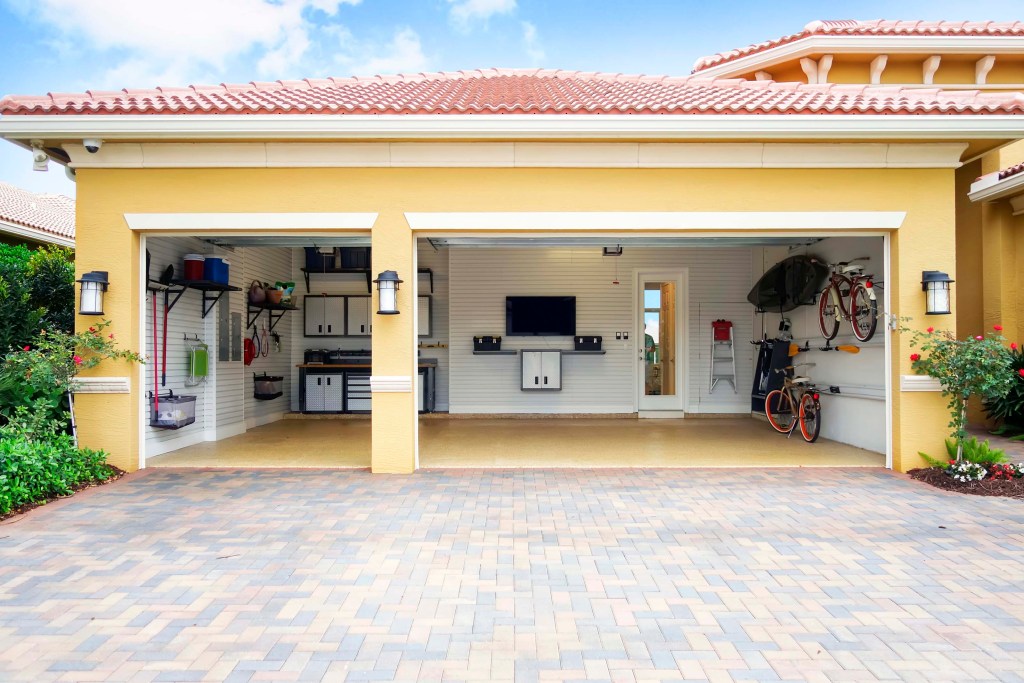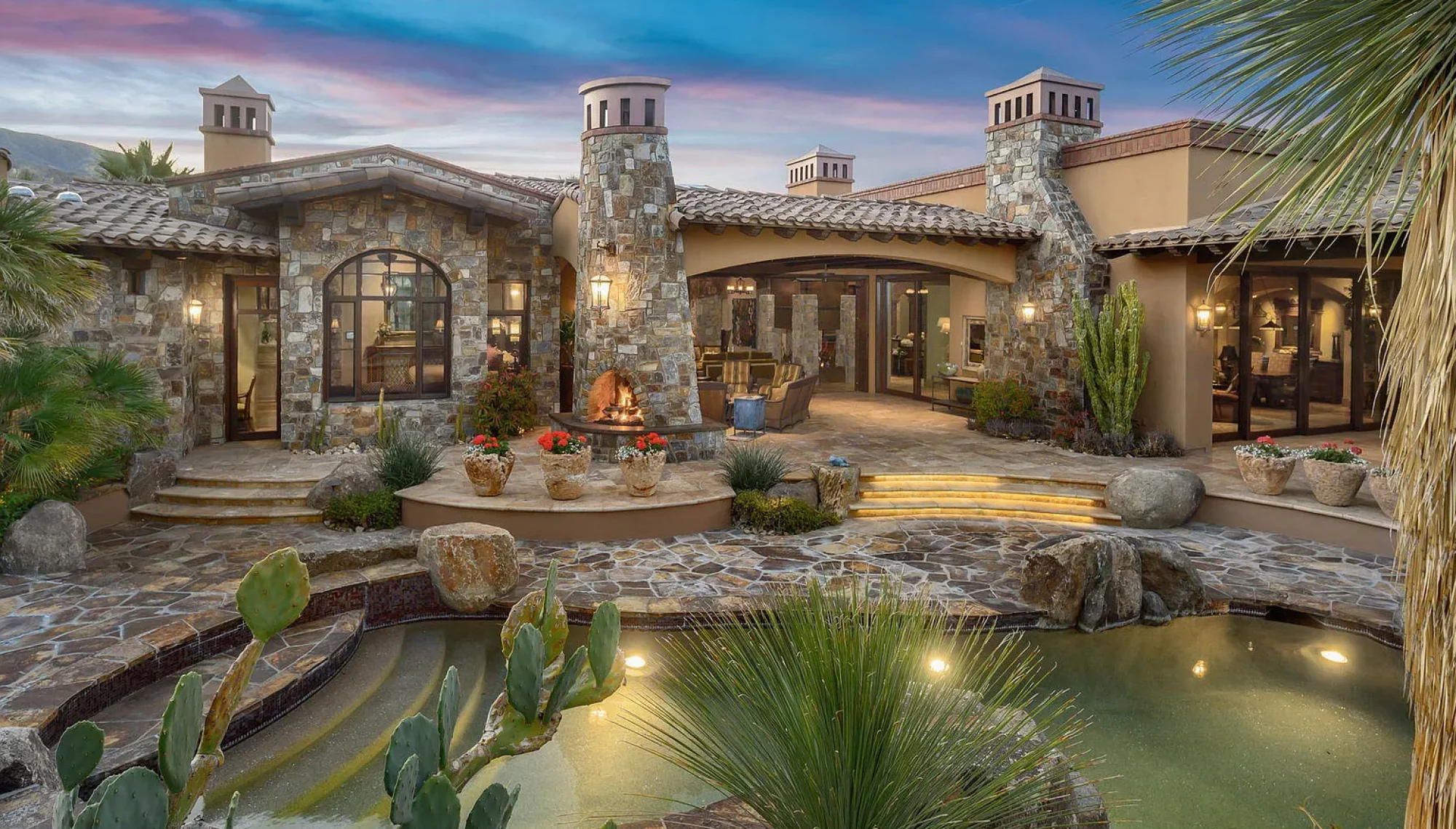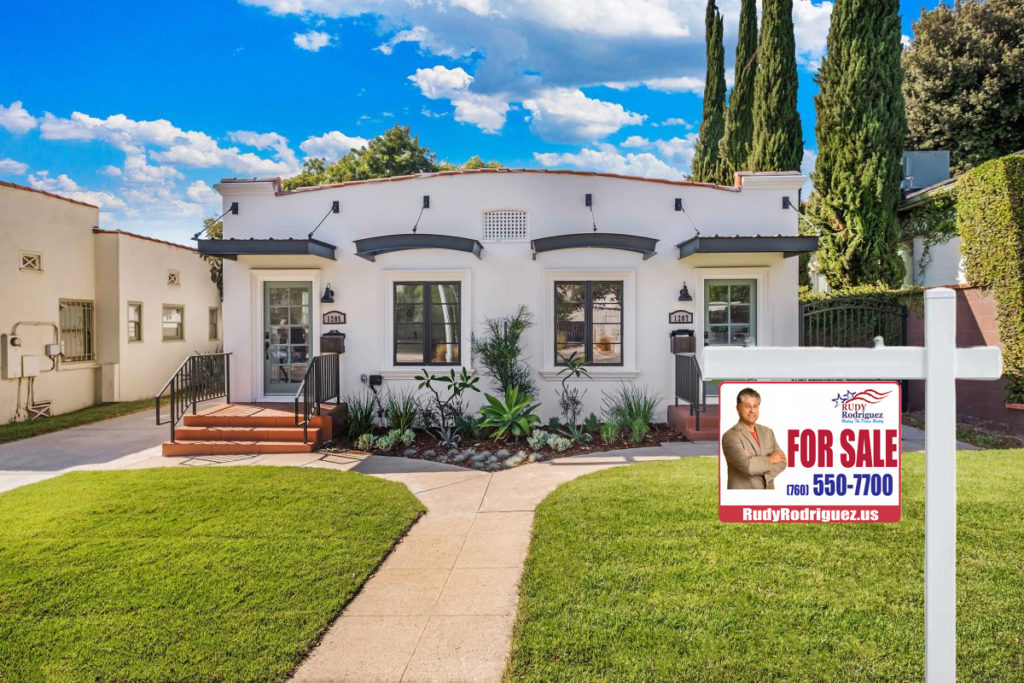How to Update Your Garage Floor

New garage flooring is an easy fix — pick the right option for how you’ll use the space.
You can make your garage look a lot better by updating just the floors. Yes, garages deserve love, too. And new garage flooring is a relatively simple improvement that can make a big difference in how the space looks and functions. Sure, concrete slab floors are functional, but other garage flooring ideas are more stylish and can boost your home’s overall value.
Choosing the right garage flooring depends on how you intend to use your garage and how it’s built. So, whether you plan to turn your garage into a workspace, a man cave, or an art studio, there’s a garage floor covering designed for that use.
Here are some considerations when you’re choosing garage flooring. We’ll also help you pick the best flooring for your garage makeover by weighing the benefits and costs of popular options like garage floor epoxy, interlocking tiles, paint, and vinyl sheets. Let’s go!
Factors to Consider When Selecting Garage Flooring
Before you choose garage flooring, think about how you intend to use the space, the climate where you live, and your budget.
How You Use Your Garage
What you’re going to do in your garage is the biggest consideration when you’re sifting through garage flooring ideas. If you plan to park your vehicles or repair them in there — you know, use your garage for cars — you’ll want garage flooring tough enough to withstand tire skid marks and oil spills. If you plan on leaving your cars in the driveway and using your garage as an extension of your home — a place to watch movies, shoot pool, or let the kids have sleepovers — you can choose flooring meant for human use. Think carpet or tile.
Or maybe you’re going for an in-between option, where you turn your garage into an art studio or workshop. Define your goals before you start shopping for garage flooring.
Weather Conditions
If your garage isn’t climate controlled and will experience major temperature changes or exposure to moisture, choose tough flooring. Pick a surface that can resist mold, mildew, and cracking caused by extreme temperature swings.
Keep the climate in mind when installing garage flooring, too. Most garage floor installs go better when the materials are warm. So, if you’re installing your flooring in fall or spring, bring the materials inside to warm up overnight before laying the floor.
Floor Conditions
Take a look at the condition of your garage floor right now. If the concrete floor has cracks, stains, or moisture issues, you’ll need to clean and repair it before putting in a new floor. Existing oil and grease stains almost always bleed through a new coat of paint. And no floor material will get rid of moisture coming in through the doors or up through the floor.
The condition of your existing floor will determine the scope of the project and impact your garage flooring options.
Installation and Maintenance Costs
You’re not made of money, so keep your budget in mind as you shop materials and contractors. Get quotes from at least three companies so you can price shop and make the best decision when choosing one to do the work.
Be aware of what the maintenance costs will be on your new garage flooring, too. Flooring that’s cheap to install initially (hello, standard latex floor paint) may cost you more in the long run if it doesn’t last or requires a lot of upkeep.
Best Garage Flooring Options
You can choose between coatings and coverings, paints, stains, carpets, floor mats, or tiles. Here are some pros and cons of popular garage flooring options.
Garage Floor Concrete Sealer
Concrete sealers can protect your garage floor from weather, oil spills, moisture, and water. The types of floor sealers are penetrating sealers, acrylics, polyurethanes, and epoxies.
Benefits
These sealers repel moisture and extend the life of concrete garage flooring. They also help your floor resist stains so cleanup is easy when your 14-year-old spills lawnmower oil on the garage floor.
Square Foot Costs
The price of a concrete sealer depends on the type. A basic sealer can cost 15 cents to 25 cents per square foot, while a high-end sealer can run up to $2.50 per square foot.
Garage Floor Epoxy Coating
An epoxy coating is a two-part treatment applied to the top of your garage floor, much like paint. But epoxy coating is tougher than paint because it contains a resin and hardener that combine to form a durable shield for your garage flooring.
Epoxy coating comes in several designs and color options. Some contractors add mica or quartz to give the coating a speckled look or metallic sheen.
Benefits
Since epoxy coating can go on top of your existing garage flooring — assuming the floor’s in good repair — it’s more affordable than tile or vinyl.
Epoxy can cover minor defects and imperfections in the floor. It also protects your floor from cracking, staining, and moisture damage.
Square Foot Costs
Epoxy flooring ranges from $3 to $12 per square foot.
Garage Floor Concrete Stain
Concrete stain gives your garage flooring an aesthetically pleasing marble effect. It makes the floor look like natural stone instead of poured concrete. It’s a good choice if you plan to use the garage as a living area or a studio. The application process is straightforward, but concrete stain needs to be refreshed regularly to protect your floors and maintain their looks over time.
Concrete stain is either water-based or acid-based.
Water-based
Water-based concrete stain comes in more colors and dries quickly. It contains fewer toxic chemicals, so it’s better for you and the planet. You need to use a concrete sealer with a water-based stain to increase its longevity.
Acid-Based
Acid-based concrete stains create a chemical reaction that will alter the look of your concrete. So, the final appearance can be a bit hard to control. For this reason, applying acid stain to a garage floor isn’t a job for a first-time DIYer. However, acid stain lasts longer than a water-based stain and doesn’t need a sealant. So, while you’ll need to pay a pro to install acid stain, you’ll have less long-term maintenance.
Benefits
Concrete stains are fire resistant and low maintenance. Stained garage floors are durable and long-lasting because the stain penetrates the concrete surface rather than sitting on top of it.
Square Foot Costs
The cost of concrete stain is around $2,000 for a 200-square-foot space — about $10 a square foot.
Garage Floor Paint Coatings
Paint can give your garage floors a protective, attractive finish. It’s a good choice because you can DIY. You don’t need to pay a pro to roll a few coats of paint on your floors.
You can use latex or acrylic paint.
Latex
Latex paint is water-based and contains a small amount of acrylic resin. It costs less than epoxy or acrylic paint, dries quickly, and doesn’t have harsh fumes. Latex paint won’t offer your floors much protection from weather or stand up to parked cars. So, it’s a good choice for a garage that will be used as a converted living space and won’t be exposed to the elements.
Acrylic
Acrylic paint is easy to apply and has a higher acrylic resin content, so it’s less likely to crack and chip over time. It’s more durable than latex paint, but it costs more. Acrylic paint also doesn’t fade in sunlight, so colors stay brighter longer.
Garage Floor Interlocking Flexible Tiles
Interlocking flexible tiles are another flooring option to give a garage a facelift. They’re a good choice for a garage with a concrete slab that’s badly stained or cracked. Tiles are available in hard plastic or polyvinyl chloride, also known as PVC, and are easy to install. A reasonably handy person could DIY.
Rubber PVC Garage Tiles
These tiles are watertight (not waterproof) and resist mold and mildew.
Plastic Garage Tiles
Plastic garage tiles are made of high-impact polypropylene and come in a range of styles and colors. They allow for air and water drainage underneath, so they’re a good pick for a humid climate. They can withstand the wear and tear of vehicles pulling in and out of your garage.
Benefits
Installing interlocking is simple. They lock in place, and the job requires minimal tools. If you decide to DIY, you can save money. You can also customize the design for your garage floors with tiles. For example, you can pick different color schemes — like a checkerboard pattern — that will protect your garage floor and give the space some design chops.
Square Foot Costs
Interlocking garage tiles cost $2 per square foot to $20 per square foot, depending on the material’s thickness.
Garage Flooring Mats
One of the easiest and most affordable ways to upgrade a garage is to roll out mats made from rubber or PVC. Like garage tiles, garage floor mats come in different styles and colors, and they can be installed over concrete floors that have minor stains or damage with no prep work. Some mats are like rugs while others are like padded gym mats.
Benefits
Garage floor mats are super easy to install, easy to clean, and durable. You can totally DIY. They also resist oil, chemicals, and stains, so they’ll protect your garage floors.
Flooring mats warm up a garage a bit by insulating those cold concrete floors, so they’re a good choice if you use your garage as a yoga studio, a workshop or something other than parking space. Garage floor mats can also absorb sound.
Square Foot Costs
Most garage mats cost $3 to $10 per square foot.
Garage Flooring Vinyl Sheet
Vinyl sheet flooring is an economical, durable option for your garage. It resists stains, scuffs, and scratches,k and you can install it easily and quickly.
Benefits
Vinyl sheet flooring resists water, oil, salt, antifreeze, grease, and chemicals. To install it, you just cut it to size with scissors or a knife and roll it out. There’s no need to hire a pro. To clean it, just hose it off.
Square Foot Costs
The square foot cost of sheet vinyl for your garage ranges from $1 to $5.
Other Garage Remodel Ideas When Your Floor Is Finished
Once your new garage floor covering is in place, you’ll have a solid foundation for making other improvements. How about converting your garage into a living space or home gym? Or creating a simple garage workshop where you can do woodworking and art projects?
A finished garage — one that’s been cleaned, glammed up, and organized — makes your home a nicer place to live. And while a finished garage may not add much to an appraisal outright — you have to do a full conversion and hook the garage up to a climate control system to directly impact the appraisal — it does add a wow factor that could impress buyers.
So, whether you opt for a finished garage that’s an attractive and functional indoor-outdoor space, or a fully converted garage that extends your home’s indoor living area, a new garage floor is a good first step.

Certified Probate & Trust Specialist
As a Certified Probate & Trust Specialist you can rest assured that as a Real estate professional, I have the understanding of the Probate transaction and can represent sellers or buyers in probate transactions, as well as investors looking to purchase probate properties.
© RudyRodriguez.us 2025

